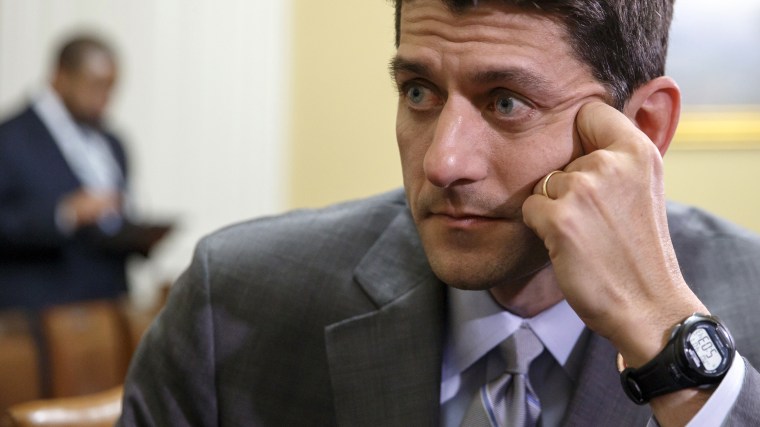If it seems every few months brings us another installment in the "Paul Ryan cares about poor people" series, it's not your imagination. In November, the
Washington Post helped get the ball rolling with
a front-page article on the House Budget Committee chairman, celebrating the congressman for his efforts "fighting poverty and winning minds."
The gist of the piece was that the far-right congressman is entirely sincere about using conservative ideas to combat poverty.
In December, BuzzFeed's McKay Coppins ran a
related piece, and today Coppins
published another: Ryan is "trying to challenge the notion that his party is out of touch with poor people the old-fashioned way: by talking to some."
The men begin filing into the Emmanuel Missionary Baptist Church in Indianapolis around 5:30 a.m. They are ex-convicts and reformed drug dealers, recovering addicts and at-risk youth: a proud brotherhood of the city's undesirables. Some of them like to joke that if he were around today, Jesus would hang out with reprobates like them. On this cold April morning, they're getting Paul Ryan instead. Ryan has been here once before, about a year ago, but most of the congregants rambling in through the front door don't appear to recognize the wiry white guy loitering in the lobby of their church. He is sporting khakis and a new-haircut coif, clutching a coffee as he chats with three besuited associates. A few parishioners come up and introduce themselves to him, but most pass by, exchanging quizzical glances and indifferent shrugs. After several minutes, a sturdy, smiling pastor named Darryl Webster arrives and greets their guest of honor. "I appreciate you coming," Webster says as he clasps the congressman's hand. "You know, when you get up this early in the morning, it's intentional." "Usually when I get up this early, I get up to kill something," Ryan cracks.
It was a hunting joke.
In any case, Coppins' lengthy article reads quite nicely: the Wisconsin Republican really has invested considerable time and energy in going to inner cities, meeting with community leaders, and talking to people who've struggled with poverty. If someone who's otherwise unfamiliar with Ryan reads the 7,000-word piece and nothing else, he or she would likely come away with the sense that his interest in helping poor communities is sincere.
The trouble, however, are the parts of Ryan's vision and policy agenda that Coppins neglected to mention.
For example, just last month, Ryan published a lengthy audit of sorts, criticizing federal efforts to combat poverty. It generated some attention, though what was largely overlooked was the fact that the Republican congressman was soon accused of
misrepresenting much of the academic research he cited in his report.
Soon after, Ryan suggested low-income children who rely on the school-lunch program
aren't treasured the way wealthier children are, relying on an anecdote that wasn't true anyway.
Then earlier this month, Ryan released a new budget blueprint that cut spending $5.1 trillion, specifically targeting public services that benefit -- you guessed it --
those on the lowest end of the socio-economic scale. Most notably, the Republican's plan focused on slashing investments in health coverage, food assistance, and college affordability.
My point is not to question Paul Ryan's sincerity. I don't know him personally and I have no reason to question whether he means what he says about trying to combat poverty his own way.
Rather, my point is put aside his rhetoric and question the efficacy of his policy proposals. And on this, Jared Bernstein
recently said of Ryan, "the emperor in the empty suit has no clothes," adding:
Ryan Poverty Plan1. Cut spending on the poor, cut taxes on the wealthy2. Shred safety net through block granting federal programs3. Encourage entrepreneurism, sprinkle around some vouchers and tax credits4. ???5. Poverty falls
Matt Yglesias
added this morning, "I admit that this way of looking at things is a bit less colorful than following Ryan around a bunch of visits to low-income neighborhoods. But to the extent that you want to know how an increase in political power for Ryan and his allies is likely to impact the lives of American citizens, it's worth looking at these things. His big job in politics is to write budgets. And his big budget idea is that rich people should pay lower taxes, middle class and working class people should pay more taxes, and poor people should get less food, medicine, and college tuition."
